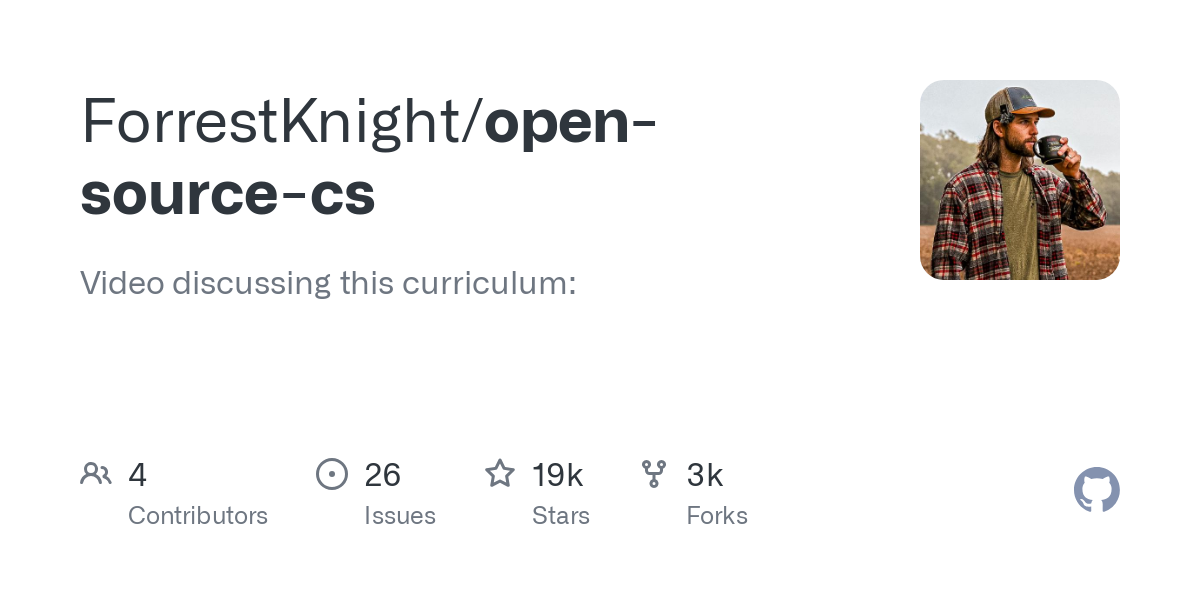An excellent discrete maths textbook for those missing the inclusion of the subject in the course: Discrete Mathematics - An Open Introduction, 3rd edition by Oscar Levin
Not a bad list. Off the top of my head, I would say it is missing two things:
- Discrete Math (formal logic, sets, probability, etc)
- Theory of Computing (not just algorithms, but things like Turing machines, NFAs, DFAs, etc.). These may not be strictly the most practical courses, but I think a Computer Science degree would be incomplete without these.
The “Introduction to Operating Systems” link no longer works (redirects to “Autonomous Systems” courses). Instead, I would recommend using Operating Systems: Three Easy Pieces, which is the textbook I use in my OS course.
Finally, something like The Missing Semester of Your CS Education would also be a nice extra.
As others have said, discrete math is one of the obvious missing pieces. My uni also has C as the first language students learn as a part of their degree, and follows up with Java and Haskell to teach students about OOP and FP as paradigms. It’s useful to have something like C so students can learn about memory management. I’m also not seeing anything on Networking and Cyber Security (aside from Cryptography), which my university also taught.
Discreet math, Calculus, and Physics change the way I think about code
Why is it important in this day and age to learn about memory management? That’s like saying it’s important to learn cursive, when it really isn’t.
Embedded. I’m currently writing software with 96 bytes of RAM. My next project I get to splurge and have 8kB of RAM and 32k of Flash.
I’m more scared with how badly I’ll handle/manage the 8k of RAM.
Also anywhere where a GC is just too slow. Like in videogame engines.
That’s a very specific usecase though that the majority of programmers likely will never have to face.
Taking courses which involve subjects that you will likely never encounter in the workforce is a thing in every discipline. Most engineers don’t need to manually solve differential equations in their day jobs, they just need to know that they exist and will often require numerical solutions.
Getting your hands dirty with the content provides a better understanding when dealing with higher level concepts.
I think it’s more important than ever. Software is getting slower and slower, and the bloat is ridiculous. Imho this is because we just work with abstractions over abstracions ignorant to how it will be computed on a real machine. I think a more appropriate methapor would be, that you can speak and understand language (program) while being illiterate at the same time (not having a fundamental understanding on how a computer works). Of course this is a exaggeration, you don’t need to know about these stuff to be a adequate programmer I think.
How did I miss this five years ago? What an excellent idea. I think we should be able to just finish the coursework and then put it on our resume.
I love this idea so much. I’m established in my industry but I think I’ll start working on it and just add to my resume. Thanks for sharing.
How would you add this to your resume? What would you write it as?
At the bottom in the
Education, Professional Development, & Credentials
section
Something like: Open Source Computer Science Coursework Completed XX hours of coursework through ABCD, EFGH, HIJK Universities Relevant Coursework: Linear Algebra (Princeton); Machine Learning (Stanford); Cryptography (Stanford)
It would weigh less than my traditional degrees, but if pressed on it (unlikely), I would describe exactly what this is: an effort to liberate CS education in the spirit of the Free Software movement, using synchronous and asynchronous learning methodology in an online learning platform from accredited, reputable universities.
At this point in my career, it would show continued aptitude for growth and professional development, since it’s been close to two decades since my first degree.
Also, at this point, I’ve seen people put shit like Strayer U and ITT Tech and Liberty on their resume and get hired for very high paying jobs. Honestly I would take this over that trash.
Even 15 years ago, most lower level undergrad coursework was 150+ students in a lecture hall where the professor would pull up Blackboard and just load the slideshow. It was only at the 300+ level where class size shrunk down and interpersonal relationships sort of mattered.
My wife’s graduate degree a few years later but still over a decade ago was almost entirely online; they only met in person to discuss their progress towards the capstone. And she has a nice prestigious degree with a very expensive university name on it, walked across the stage at that University, and nowhere does that diploma read, “Online.”
I have a lot of beef with the US university system. Change has to start somewhere.
What was the university and degree program? I might want to check it out.
If the Computer Science Degree is open source that means I can redistribute it.
You wouldn’t download a PhD.
Commenting here to save this conversation.











